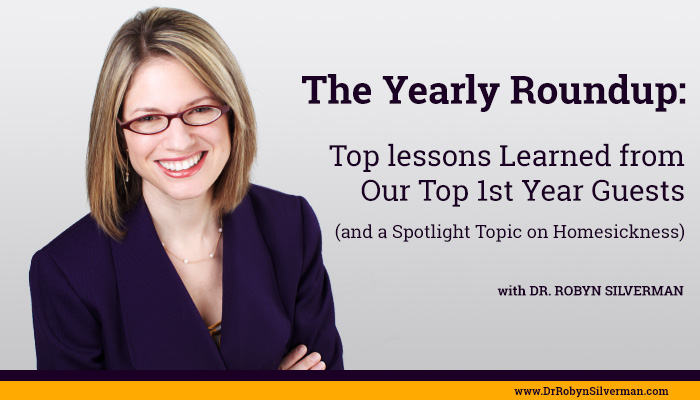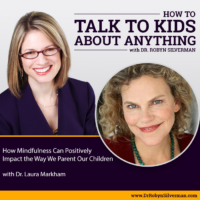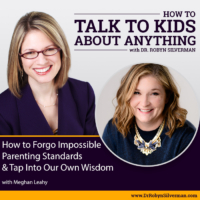Podcast: Play in new window | Download
Subscribe: Apple Podcasts | RSS | More
First Year Round Up! Top Lessons Learned from our Top Experts
This podcast provides a round up of some of the most downloaded episodes of How to Talk to Kids about Anything podcast—celebrating the completion of it’s very first year! What are some of the top tips that we’ve learned? How do these tips apply to our lives? Dr. Robyn Silverman provides her take on these top tips.
This is actually a pretty important episode as it marks the one-year anniversary of the start of this podcast. We’ve had some amazing guests, spent over 50 hours together and learned about a host of topics from how to talk to kids about big feelings and dealing with failure to how to talk about mental strength, online safety, divorce, sex and sibling rivalry. And after over 65,000 downloads, at this year mark, I’m excited to embark on this next year with you.
Before we move forward, I’d like to take some time to look back at some of the lessons learned from our most downloaded episodes. We’ll talk about some upcoming guests and we’ll have a spotlight topic—discussing an area that I’ve been presenting on and writing lately—homesickness! Many people have asked me to discuss this topic as their kids are going to be traveling away from home this summer or during the year for various sports or sleepovers. I’m going to touch on that topic and let you know where you can learn about it further from me in an upcoming free webinar!
And before we get started- I just want to say thank you. It’s amazing to have such a committed and loyal audience- I’ve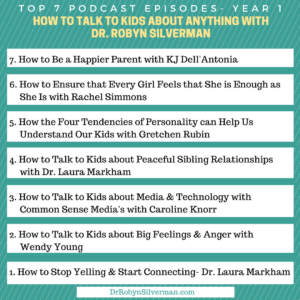 had people tag me in Instagram posts and twitter posts and Facebook posts and even sent me notes that say—I listened to your podcast and I used the tips and scripts you provided and it worked! Or, I passed the podcast episode along on calming strategies or death or bullying to someone who is having a hard time with that exact problem and it was just what she needed. Sitting here in my office doing the podcast in NJ, it feels great to picture all of you. Sitting in the car, sitting in your homes or the coffee chop of wherever you are listening to these episodes—and feeling like they are just what you need. As I’m writing a book based on this podcast, you will be getting even more and when it comes out, you will all be the first to know. Thank you from the bottom of my heart. I appreciate you.
had people tag me in Instagram posts and twitter posts and Facebook posts and even sent me notes that say—I listened to your podcast and I used the tips and scripts you provided and it worked! Or, I passed the podcast episode along on calming strategies or death or bullying to someone who is having a hard time with that exact problem and it was just what she needed. Sitting here in my office doing the podcast in NJ, it feels great to picture all of you. Sitting in the car, sitting in your homes or the coffee chop of wherever you are listening to these episodes—and feeling like they are just what you need. As I’m writing a book based on this podcast, you will be getting even more and when it comes out, you will all be the first to know. Thank you from the bottom of my heart. I appreciate you.
Dr. Robyn Silverman is a well-known professional speaker, child & teen development specialist and leadership coach who appears regularly as an expert on many national TV such as The Today Show, Nightline and Good Morning America. She is a monthly parenting columnist for US News and World Report and is often quoted in print articles for her hands-on parenting and child development expertise. Known for her positive and accessible solutions to challenging problems, she speaks worldwide to diverse audiences; from company leaders and corporate groups to educators, camp professionals, government offices, children and parents. An award-winning writer and success coach, she has contributed as a child development expert to over for 20 books and is currently writing her second book based on her popular parenting podcast, How to Talk to Kids about Anything. On her podcast, she interviews the top experts in their fields who give all the tips, scripts, stories and steps to make every conversation (even the really tough ones!) easier. From talking to kids about divorce, adoption, anger, stress management and allowance to how to talk about death, sex, porn, screen time or ADHD (and more!), she’s got you covered! Check it out on iTunes of her website. You can find out more about Dr. Robyn at DrRobynSilverman.com, on Facebook at Facebook.com/DrRobynSilverman, on twitter at @DrRobyn or on instagram @DrRobynSilverman.
This podcast provides:
- Top Tips: The top tips from 7 of the most downloaded episodes
- Sneak peek: Upcoming guests
- A spotlight on homesickness and children
- Dr. Robyn is going to be doing a webinar!
Important Messages:
- What you want now isn’t always what you want later. These steps take longer but when we think about what we
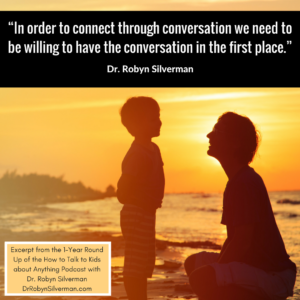 really want in the future, it’s money in the bank. We are helping to create the kids and the citizens I want to raise.
really want in the future, it’s money in the bank. We are helping to create the kids and the citizens I want to raise. - We care so much about our children and what they are going through and what frustrates them and hurts them and makes them feel bad or unworthy or scared or sad. When we see our children going through these upsetting situations, we need to check ourselves.
- What our kids need in order to get something done but it’s also important to know what we need because it’s not always the same as what our kids need. What YOU need may not be what THEY need. And that’s a top takeaway we should remember.
- Every child needs to feel secure in the parent child relationship. When they feel secure in the parent child relationship, they will develop a more secure sibling relationship.
- Try to enter your children’s tech world (instead of shutting the door on it) and be respectful of it so that they will share it with you. When we are open to sharing their world they are more likely to listen to us and be open to hearing our views.
- Technology is a tough one- and we’ve interviewed some of the best people on this topic from Sue Scheff who talks about online shaming to Devorah Heitner who talks about Tech Milestone and Digital Readiness and Susan Bartell who discusses digital footprint, and even Eric Sheninger who discusses the upside of technology in schools. We recently discussed the power of media and media literacy with Dina Alexander- so if this is an interesting topic- we’ve covered a great deal of it and I encourage you to listen to those podcast episodes.
- It’s normal for us to get frustrated, angry, irritated, annoyed and downright furious when we are parenting. Children are frustrating at times and it can feel cumulative and overwhelming.
- We also need to know what works for us to keep us calm. You matter. As one of my favorite people in the world says—and you heard her yourself on one of the first podcasts on how to talk to kids about ADHD and impulsivity, Dr. Dehra Harris says; “you matter in equal measure.”
- Your child’s brain takes shape based on their environment. And we can change that environment if we change our behavior.
- We can’t control anyone else’s behavior but our own. And remember, it is all about the relationships.
Notable Quotables:
- “Don’t put your child first unless they’re bleeding.” KJ Dell’Antonia
- “You can be happy even when your kids aren’t.” KJ Dell’Antonia
- “What you want now may not be what you want later.” -KJ Dell’Antonia
- “Check yourself before you wreck yourself. Whether or not your daughter will tell you this, she is 100% looking at you to tell you how stressful the situation is.” -Rachel Simmons
- “Recognize that you going to be running into all different people with all different tendencies all the time. And they can be different from you. You need to think about the tendency as you try to manage yourself and other people. Just knowing this can make it much easier to subtly change things in a way that is going to help other people get with the program better.” -Gretchen Rubin
- “Our children need to know that no one could ever love them more and whatever their sibling is getting, there is always more than enough for them.” -Dr. Laura Markham
- “Every child needs to feel secure in the parent-child relationship and when a child feels secure in the parent-child relationship, s/he will develop a more secure sibling relationship.” – Dr. Robyn Silverman
- “When choosing media for your family, use your values as your north star. Ask yourself; does this media support my values? And how can I use this media to support my family’s values? – Caroline Knorr, Common Sense Media
- “Keep the lines of communication open and talk about media and technology early and often.” – Caroline Knorr, Common Sense Media
- “We are human beings, if we happen to raise our voice, know that not one of us is perfect…’Who better to raise a human child than a fellow human being?’” – Wendy Young
- “Feelings don’t stay big forever. They will eventually subside just like waves that crash against the shoreline. They do eventually recede and go away.” – Wendy Young
- “Our ability to keep our cool walk our children through the steps of keeping themselves calm is going to contribute significantly to their ability to learn self regulation.” –Wendy Young
- “You matter in equal measure.” –Dr. Dehra Harris
- “If you live with children…you’re going to have childish behavior.” – Dr. Laura Markham
- “Rage only dissipates when it feels heard”- Dr. Laura Markham
- “We are told by society that we are supposed to control our children but we all know we can’t someone else’s behavior—but you can always control you and what you bring to the situation.” – Dr. Laura Markham
- “Don’t get so worried about what you are going to say to your child about a given topic that you say nothing.” – Dr. Robyn Silverman
- “In order to connect through conversation we need to be willing to have the conversations in the first place.” – Dr. Robyn Silverman
Resources:
FREE WEBINAR with Dr. Robyn on HOMESICKNESS –> http://www.DrRobynSilverman.com/homesick
Podcast Episodes:
- How to Be a Happier Parent with KJ Dell’Antonia http://bit.ly/KJDell_PC
- How to Ensure Your Daughter Feels She is Enough As She Is with Rachel Simmons http://bit.ly/RSimmons_PC
- How the Four Tendencies of Personality Can Help Us Better Understand Our Kids with Gretchen Rubin http://bit.ly/GRubinPC
- How to Talk to Kids about Peaceful Sibling Relationships with Dr. Laura Markham http://bit.ly/LMarkhamPC
- How to Talk to Kids about Media and Technology with Common Sense Media’ Caroline Knorr http://bit.ly/CommonSensePC
- How to Talk to Kids about Big Feelings and Anger with Wendy Young http://bit.ly/WYoungPC
- How to Stop Yelling & Start Connecting with Dr. Laura Markham http://bit.ly/LMarkham2_PC
Books Featured in This Episode:

